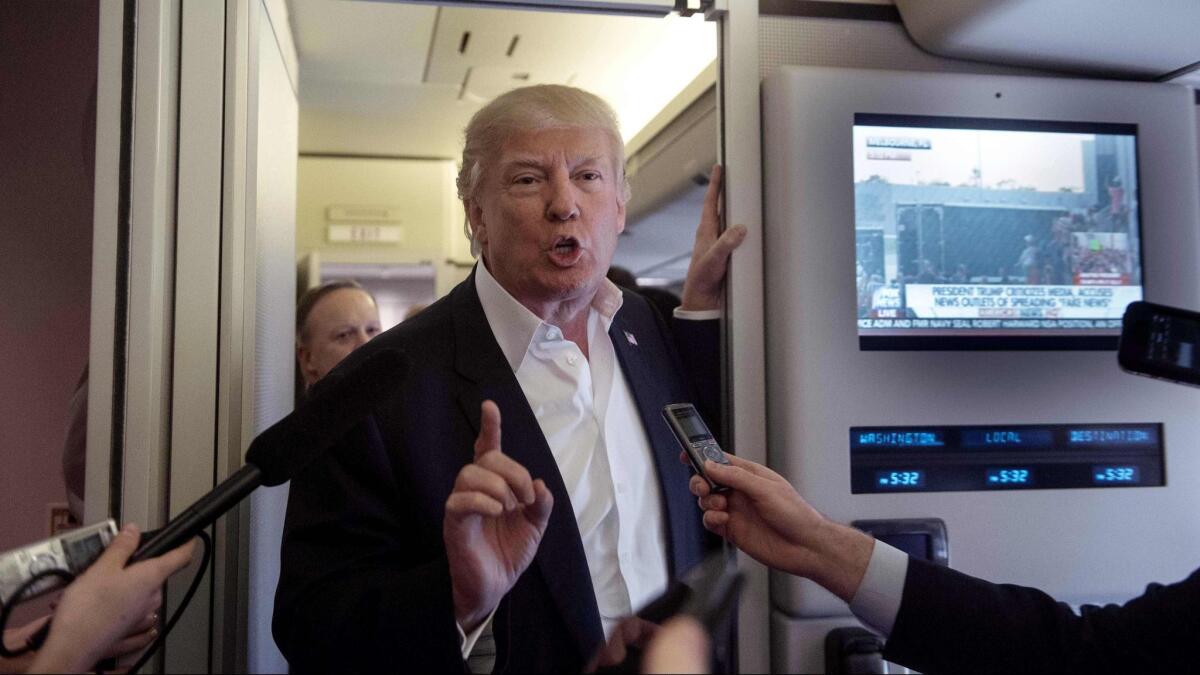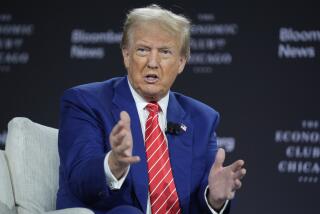White House denies any collusion between the Trump campaign and Russia

Reporting from Washington — As questions deepened about ties between President Trump’s administration and Vladimir Putin’s Russia, White House Chief of Staff Reince Priebus flatly denied Sunday that the two camps colluded during the 2016 presidential campaign.
Priebus, in a series of news-show interviews, also insisted that ousted national security advisor Mike Flynn had done nothing illegal in discussing sanctions against Russia with the country’s ambassador to Washington prior to Trump’s inauguration, and batted aside questions about disorder and disarray in the White House.
Priebus, who was not on Trump’s campaign, has previously said he could not speak to any involvement with Russia by campaign staff. But asked on “Fox News Sunday” whether there was collusion “between anybody involved with Trump and anybody involved with Russia” during the campaign, he replied: “No.”
He was somewhat more equivocal in a separate interview on NBC’s “Meet the Press,” when asked about a New York Times article last week that alleged contacts between the Trump campaign and Russian operatives. U.S. intelligence assessments have said Russia interfered in the election with the aim of aiding Trump.
“We don’t know of any contacts with Russian agents,” Priebus said. The chief of staff also told NBC he was not aware of anyone else in the White House, other than Flynn, who was forced to resign last week, having been interviewed by the FBI about Russian contacts.
Priebus, in the Fox News interview, cited “top levels of the intelligence community” as having assured him that the account of the Trump campaign’s “constant contact with Russian spies” was incorrect, but he did not cite any official or agency.
The Flynn affair, coupled with Trump’s strikingly harsh attacks on the news media in recent days, has stirred fresh unease among some lawmakers about the Trump administration and Russia.
Defense secretary breaks with Trump on declaring that media are ‘enemy of the American people’ »
“Russia is leading a movement around the world to spread autocracy and authoritarianism,” Rep. Adam Schiff (D-Burbank), the ranking member of the House Intelligence Committee, told ABC’s “This Week.” He said it was of “profound concern” to him that Trump was more focused on attacking the media than “what Russia is doing.”
Priebus’ account of Flynn being forced out took a more accusatory tone toward the former national security advisor than Trump himself has in public statements. The president has defended the volatile retired general as a “good man” and repeatedly railed against what he described as “fake” news reports based on leaked information.
Priebus told NBC that questioning of Flynn led the White House to suspect that “he wasn’t being straight” about his pre-inauguration discussions with the Russian ambassador.
Flynn’s forced resignation followed a report in the Washington Post, which said the then-acting attorney general informed the White House weeks earlier that intelligence intercepts of the calls did not square with the account Vice President Mike Pence said publicly he had been given by Flynn.
Priebus confirmed that the conflicting accounts had been known to the White House since “sometime after” Jan. 27. The Post story was published online Monday, hours before Flynn was fired.
Flynn maintained “that he never talked to the Russian ambassador about sanctions, but still, something wasn’t adding up,” the chief of staff told NBC interviewer Chuck Todd. “And eventually, we determined that he did.”
Priebus brushed aside suggestions that the timing suggested that Pence had not been fully informed as doubts emerged within the administration about Flynn’s truthfulness.
“The vice president’s in the loop on everything,” he said, adding: “It felt like it happened very quickly.”
The Flynn revelations reignited longstanding worries by congressional Democrats and some Republicans about Trump’s often-expressed admiration for Putin and about intelligence assessments that the Russians worked to sway the presidential election in Trump’s favor— particularly against the backdrop of Trump’s escalating war on the news media, which he described on Twitter last week as an “enemy of the American People!”
Sen. John McCain (R-Ariz.), a leading Russia hawk, said on NBC that he had more “hope than belief” that the Republican-controlled Congress would fully investigate the Trump camp’s dealings with Russia. He also declared that suppression of a free and independent press was “how dictators get started.”
“I’m not saying that President Trump is trying to be a dictator,” he said on “Meet the Press.” “I’m just saying that we need to learn the lessons of history.”
Sen. Lindsey Graham (R-S.C) was more sympathetic to the White House view that coverage of Trump was at times “almost to the point of being hysterical,” but agreed that there was cause for disquiet regarding Trump’s stance on Russia.
“When it comes to Russia, the one thing that bothers me most about President Trump is that he never seems to forcefully embrace the idea that Russia’s interference in our election 2016 is something that should be punished,” Graham said on CBS’ “Face the Nation.”
“Putin is not a friend of democracy,” he added. “And if we don’t hit them hard, you will be empowering Russia.”
Twitter: @laurakingLAT
ALSO
Trump reverts to campaigning a month into his term. This time, his opponent is the media
Trump leaves the White House bubble and shifts to campaign mode, hoping for momentum
The White House has found ways to end protection for ‘Dreamers’ while shielding Trump from blowback
More to Read
Get the L.A. Times Politics newsletter
Deeply reported insights into legislation, politics and policy from Sacramento, Washington and beyond. In your inbox three times per week.
You may occasionally receive promotional content from the Los Angeles Times.










